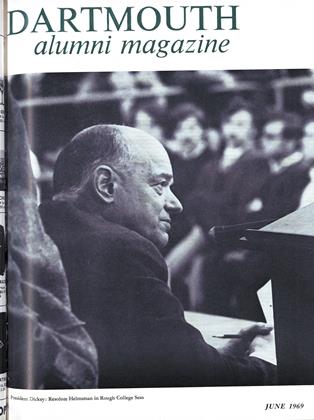By Robert Cohen '60. The University of Chicago Press, 1968. 164 pp.
Tiger at the Gates, Duel of Angels, Judith, The Madwoman of Chaillot, Ondine an important part of our experience of the theater in the English-speaking world is due to the plays of Jean Giraudoux. And it is fitting that our criticism take pains to see be is understood. In several important ways Robert Cohen's book does just that. He analyzes each of some twelve plays in its own terms; he carefully points out errors in current English versions; all quotations are translations of his own. Moreover, the University of Chicago Press has paid him and Giraudoux the compliment of giving this book an exceptionally attractive form.
Cohen is presently the artistic director of the Irvine Repertory Theater at the University of California, Irvine. Regrettably he has little to say about Giraudoux's love of the miracle by which any play comes to life on the stage, although that miracle involves make-believe, essential to man's ability to cope. Be that as it may, he is not one of those who consider Giraudoux frivolous at best or pernicious at worst. He claims in fact that Giraudoux is the patron saint of all that is in vogue in serious drama today, but he will have difficulty convincing most people. To be sure, Giraudoux knew the human condition well, its cruel ambivalences and the sad spectacle of mankind's failures. This fact in itself, however, does not answer the charge that our enjoyment of these plays is intellectual escapism. Those who claim that Giraudoux could not or would not write tragedies are right, but to like him is to say "So what?" Advocating flexibility, he reaffirmed a virtue that gave comedy a good name. "Humanity is a place," Ondine wistfully remarks, "where people forget and change their minds, where people can forgive." His opponents among the existentialists, however, demand that everyone take a stand and stick to it, and even Cohen's insistence upon the dialectics of Giraudoux's thought will not appease them. "Poke through the floating naiads and dogfish of Ondine," he promises, "and you will see the same sort of dogged depiction of man's fatal erring through a perverse universe that Sophocles portrayed in the Oedipus Tyrannos." Granted, but what about those naiads? The value of make-believe is the question on which Giraudoux's opponents stumble. Cohen seems to do it also, throwing the baby out with the bath-water, as it were.
Mr. Brooks is Assistant Professor of Romance Languages, Dartmouth College.
 View Full Issue
View Full Issue
More From This Issue
-
 Feature
FeatureEight Graduates of Dartmouth Who Were First College Presidents
June 1969 By John Hurd '21 -
 Feature
FeatureTwelve Hours and Their Aftermath: The Student Seizure of Parkhurst Hall
June 1969 By C.E.W. -
 Feature
FeatureThe Class Officers Weekend
June 1969 -
 Feature
FeatureFOUR PROFESSORS WHO ARE RETIRING
June 1969 -
 Feature
FeatureBicentennial Year Begins June 14
June 1969 -
 Article
ArticleAlumni Awards
June 1969
Books
-
 Books
BooksAlumni Publications
April 1934 -
 Books
BooksFaculty Publications
January 1936 -
 Books
BooksINTRODUCTION TO MENTAL HYGIENE
January, 1931 By C. N. Allen -
 Books
BooksOIL FOR THE WORLD,
January 1951 By FORD H. WHELDEN '25 -
 Books
BooksTHE BRITISH ATTACK ON UNEMPLOYMENT
March 1935 By H. F. R. Shaw -
 Books
BooksTelling Tales
APRIL 1978 By ROBERT H. ROSS '38


